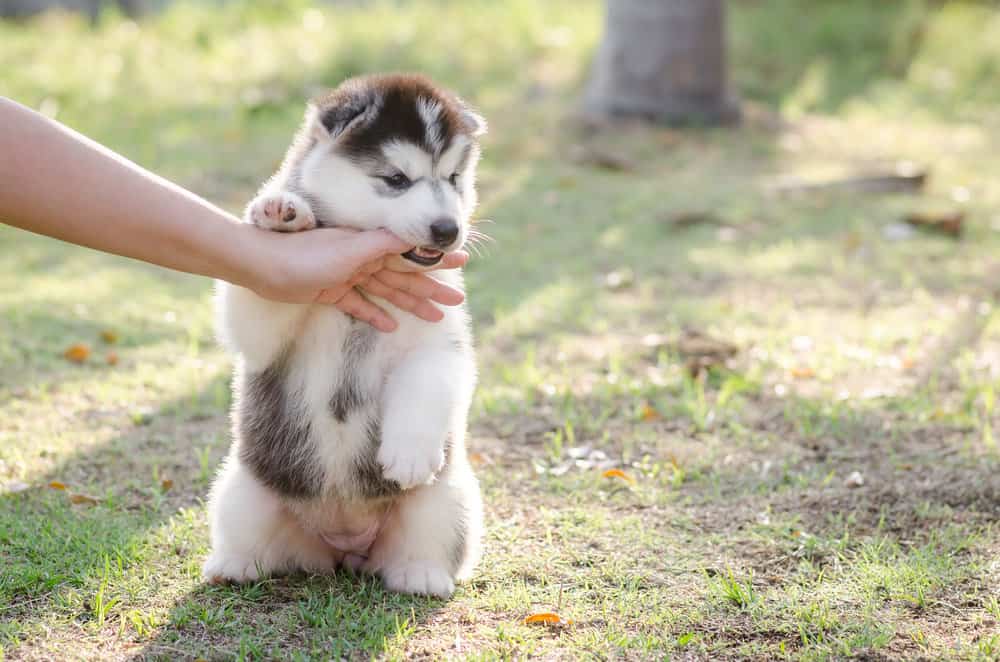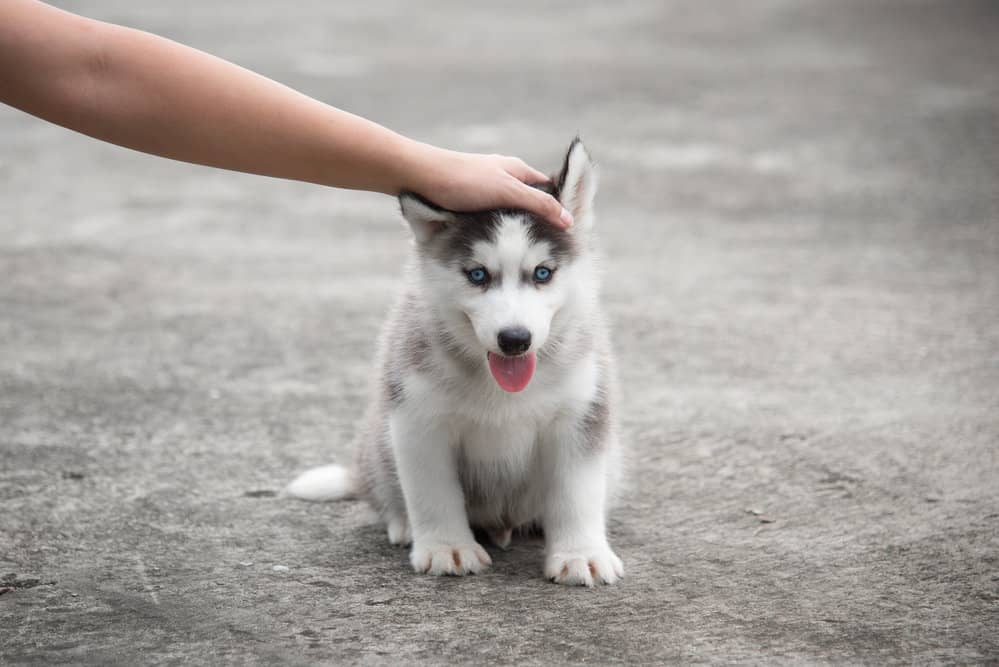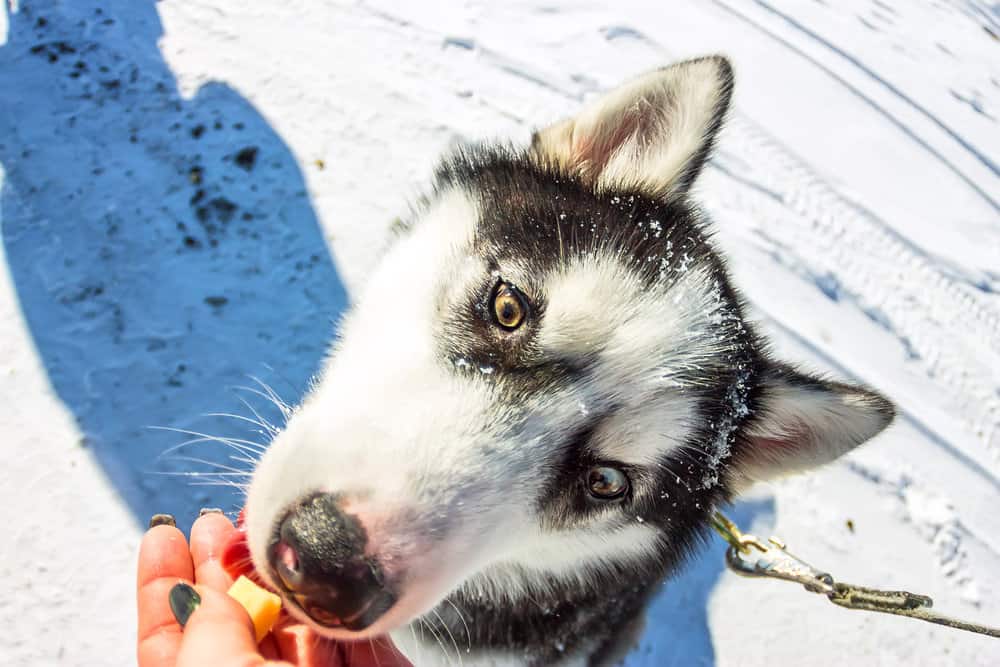A husky puppy might bite if he’s teething or uncomfortable with someone invading his space. Sometimes, the biting will simply be a form of rough play, hunting practice, or releasing energy.
While huskies aren’t particularly aggressive, they’re hunting dogs. Their behavior can leave you wondering: why does my husky puppy bite so much, and is this going to fade away with time?
3 Reasons Why Husky Puppies Are Avid Biters

Let’s take a look at three common reasons why your little husky is resorting to bites:
- Your Husky’s Hunting Skills Are Showing
More often than not, young husky puppies will want to bite everything in sight. They might even show predatory instincts towards smaller animals, like rabbits, guinea pigs, and even cats!
It’s just a blend of the regular puppies’ rough play and the huskies’ hunting nature.
However, that behavior will calm down with age, and the nipping should be less of a problem.
- Your Husky Is Teething
Keep in mind that the teething phase is challenging for puppies of all breeds. Before their deciduous teeth fall out, they could try to mimic their nursing pattern on your hands.
With the second round of teething, the huskies usually test their threshold with the new adult teeth.
They might do that anywhere from the third to the sixth month. So, you can expect slightly more biting during that time frame.
- You’re In the Puppy’s Personal Space
In most cases, huskies like being a part of the family. However, they still need a bit of personal space, especially with touching.
Each individual husky will have a limit of what they might tolerate. When you push too far, the pup might resort to biting.
The husky does not necessarily need to be afraid to bite you. It’s enough to feel uncomfortable with how you’re handling or touching him.
Helpful Dog Health Resource:
Note: Our Health is #1 Priority. It should be no different for your dog. But you need to help him. The Ultimate Guide to Dog Health is the answer. This handy guide will help you recognize the symptoms of the health problems above. Get the knowledge to stay ahead of these terrible issues that can rob your lovely dog from vigor and life. Help your friend make it to 14 yrs+ without pain and suffering.
How to Tell If a Husky Is Biting Too Much
With any breed, it’s normal to see a bit of biting. This makes it a little hard to tell if there’s something wrong with your pup’s temperament or not.
While it would be wildly convenient, there isn’t an allowed number of daily bites to go by.
Instead, the key here is noticing the general attitude and comparing it to what the typical husky temperament entails.
Here are a few warning signs that might indicate that there’s a deeper problem than just playful nipping:
- Showing food-guarding behaviors (food-aggression)
- Growling when touched
- Agitation around other pets and younger children
- Not responding to commands mid-bite
7 Tips to Deal With a Husky Puppy That Bites Too Much
It might be time to intervene if you feel like your little husky is taking the biting behavior overboard.
Here are a few tips to help you out:
- Work on Careful but Steady Socializing
Make a habit of touching your husky puppies in different spots till they’re familiar with petting and belly rubs.

Once you get this base down, you can move on to getting other people to socialize and play with your puppies.
It might sound counterintuitive with a puppy that gets irritated quickly. However, the goal here is to desensitize him to as many stimuli as possible.
You can always start by keeping your husky on a leash till you’re comfortable letting him go around strangers.
If you have kids around the house, you might also want to dog-proof the socializing area if you have kids around the house.
- Reinforce Bite Inhibition
Be proactive and use a firm “leave it” command whenever you see your husky biting something they shouldn’t bite. If the pup responds, reward him with a treat and a chew toy.
Meanwhile, you can give non-responsive puppies a mini time-out. After all, huskies adore family time, and the time-out will drive the message directly to their puppy brains.
Sometimes, simply turning your back to the puppy and ignoring him for a few seconds helps. It shows him that this behavior won’t fly around the house.
Just don’t point when you’re doing it because it might lure the pup to bite your finger instead.
- Redirect the Husky’s Attention
Knowing when to take a step back from the training is also important. So, give your pup his space to chew toys in peace.
Remember that you’ll never stop your husky from biting altogether—that’s just not realistic.
Instead, your focus should be setting what and when he’ll get to bite.
Set specific times for training each day. Outside this timeframe, you can let the pup have some fun and only intervene if he’s getting aggressive.
- Reward Good Behavior

While your husky might be a biter, he probably has a few good qualities going on for him.
Maybe he doesn’t hog the food bowl or already nailed down the house training. So, use these opportunities to build a healthy relationship with your puppy and get him to trust you.
This way, when you need to ignore or correct his destructive behaviors, you won’t be risking anxiety attacks.
- Burn Some Energy
To release all the extra energy, give your pup some exercise as an outlet for his hunting instincts.
The simple walk around the block won’t cut it with most husky puppies.
Odds are, your pup will need around an hour of aerobic activities daily. So, put in some play time with frisbees or give him space to run freely with other dogs.
As he grows, his need for exercise will decrease a bit, but for now, you have to engage him.
Helpful Dog Training Resource:
For help with training your dog, you should take a look at The Online Dog Trainer by Doggy Dan. Doggy Dan is an expert Dog Trainer based in New Zealand. His online resource contains Hundreds of Excellent Dog Training Videos that will take you step-by-step through the process of developing a healthy, happy well-behaved dog.
- Spay or Neuter Your Huskies
Much like many other breeds, spaying and neutering can help huskies calm down a bit.
In male husky puppies, the procedure might reduce the excessive biting if it stems from aggression.
Most huskies can undergo the procedure at 6-12 months, but it’s still best to check with your vet.
- Get to Know Your Husky’s Personalities
While there’s a general expectation of what a husky might behave like, no two dogs are carbon copies of each other.
Instead, you should put in some time and effort to get to know your pup. Then, after a while, it should be easier to spot his triggering points (touches, sounds, etc.) and deal with them.
Even if you end up needing professional help, knowing this information will go a long way with the training phase.

Paul has been creating content for the dog niche for many years. The information he shares comes his first hand experience growing up in dog lovers household and then owning multiple dog breeds of his own as an adult. Paul enjoys doing the hard research to collect, analyze and present our dogtemperament.com readers with the best answers to their questions.